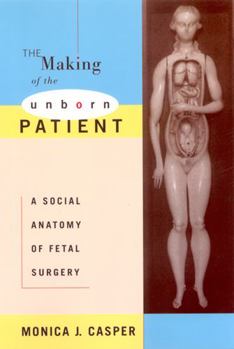The Making of the Unborn Patient: A Social Anatomy of Fetal Surgery
Select Format
Select Condition 
Book Overview
Winner of the 1998 C. Wright Mills Award from the Society for the Study of Social Problems It is now possible for physicians to recognize that a pregnant woman's fetus is facing life-threatening problems, perform surgery on the fetus, and if it survives, return it to the woman's uterus to finish gestation. Although fetal surgery has existed in various forms for three decades, it is only just beginning to capture the public's imagination. These still largely experimental procedures raise all types of medical, political and ethical questions. Who is the patient? What are the technical difficulties involved in fetal surgery? How do reproductive politics seep into the operating room, and how do medical definitions and meanings flow out of medicine and into other social spheres? How are ethical issues defined in this practice and who defines them? Is fetal surgery the kind of medicine we want? What is involved in reframing fetal surgery as a women's health issue, rather than simply a pediatric concern? In this ethnographic study of the social, cultural and historical aspects of fetal surgery, Monica Casper addresses these questions. The Making of the Unborn Patient examines two important and connected events of the second half of the 20th century: the emergence of fetal surgery as a new medical specialty and the debut of the unborn patient.
Format:Paperback
Language:English
ISBN:0813525160
ISBN13:9780813525167
Release Date:June 1998
Publisher:Rutgers University Press
Length:288 Pages
Weight:0.05 lbs.
Dimensions:0.7" x 6.0" x 9.0"
Customer Reviews
2 ratings
No easy answers
Published by Thriftbooks.com User , 25 years ago
I found this book to be a fascinating read, from the astounding photo of a fetal foot extended by surgeons' hands from the blank field of a woman's belly, to the behind the scenes look at research ethics. Casper put this experimental work in the context of fetal politics, a needed alternative to the perspective that views virtually all new medical procedures as "miracles." We need more, and more informed, public dialogue about medical experimentation, and we need more studies like Casper's. Her book is richly detailed, politically incisive, and historically and culturally informed. Few readers will be disappointed.
really opened my eyes
Published by Thriftbooks.com User , 25 years ago
I read this book because someone close to me had started working in a hospital that does this type of surgery, and told me some interesting stories. The book really opened my eyes to how fetal surgery and other medical practices are developed. After talking to my friend about it more, I was amazed to find that the types of things described in this book (basically experimenting on patients) are still going on! I think the previous reviewer must either be totally clueless, or is intentially trashing the book because he or she is is somehow invested in fetal surgery and is thus trying to squelsh criticism. Or maybe that person didn't want the moral implications of the issues raised in this book to be discussed. If you are at all interested in this issue, you have got to read this.





